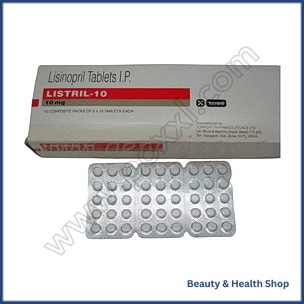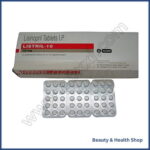ADDICTION
ALCOHOL DEPENDENCE
QUIT SMOKING
ALLERGY
ANTI FUNGAL
FUNGAL INFECTION
FUNGAL NAIL INFECTIONS
ANTI-REJECTION DRUGS
ANTI WORM
ANTIBIOTIC
BACTERIAL INFECTIONS
ARTHRITIS
GOUT
OSTEOARTHRITIS
RHEUMATOID ARTHRITIS
BLOOD
LOW PLATELET COUNT
THROMBOPHLEBITIS
VARICOSE VEINS
COLON
ANAL FISSURE
PILES
ULCERATIVE COLITIS
DIABETES CARE
DIABETES INSIPIDUS
DIABETES TYPE
DIABETIC FOOT ULCERS
GLUCOSE MONITOR
EYES/EAR CARE
DRY EYES
EYE CARE
EYE EXAMINATION
EYE INFECTION
EYE LASHES
EYE PAIN
GLAUCOMA
OCULAR HYPERTENSION
UVEITIS
FEVER CARE
MALARIA
RHEUMATIC FEVER
TYPHOID FEVER
GASTROINTESTINAL
ACIDITY
CONSTIPATION
CROHN'S DISEASE
DIARRHOEA
GALLBLADDER STONES
INTESTINAL ULCERS
IRRITABLE BOWEL SYNDROME
MOTION SICKNESS
NAUSEA
Listril (Lisinopril)
Listril 5 mg (Lisinopril)
Listril 10 mg (Lisinopril)
| Active Ingredient (Generic Name): | Lisinopril |
|---|---|
| Indication: | High blood pressure, Heart failure |
| Manufacturer | Torrent Pharmaceuticals Ltd. |
| Packaging: | 15 tablets in one strip |
From: $39.00
Lisinopril is a medication prescribed to manage cardiovascular conditions like high blood pressure, heart failure, and diabetic kidney disease. It works by inhibiting angiotensin-converting enzyme, which helps in reducing vasoconstrictor angiotensin II and promoting vasodilation. Common side effects may include dizziness, headache, and cough. Understanding the correct dosage, food interactions, and potential medication interactions is crucial for safe and effective treatment. Explore your treatment plan to learn more about Lisinopril‘s mechanism of action and expected outcomes.
Main Points
- Lisinopril, an ACE inhibitor, is prescribed to treat cardiovascular conditions such as high blood pressure and heart failure.
- By blocking the production of angiotensin II, Lisinopril reduces blood pressure and enhances heart health.
- Common side effects may include cough, dizziness, and headache, with severe reactions like angioedema necessitating prompt medical attention.
- Dosage varies based on individual health needs and medical history, and it should be taken with a full glass of water at the same time daily.
- While food interactions are limited, grapefruit juice should be avoided due to its potential to raise Lisinopril levels; caution is advised when combining the medication with diuretics, NSAIDs, and lithium.
What Is Lisinopril Used For?
Lisinopril, known by the brand name Listril, is commonly prescribed to manage cardiovascular and hypertensive conditions like high blood pressure, heart failure, and diabetic kidney disease. It helps lower blood pressure, reducing the risk of heart attack, stroke, and kidney disease. Lisinopril also alleviates symptoms of heart failure, such as shortness of breath and fatigue. In diabetic patients, it is used to treat kidney disease by reducing proteinuria. Overall, lisinopril is an effective medication for these conditions and may be included in a comprehensive treatment plan prescribed by your doctor.
How Does Lisinopril Work?
Lisinopril works by inhibiting the angiotensin-converting enzyme (ACE), which reduces the production of a vasoconstrictor, leading to vasodilation and a subsequent decrease in blood pressure.
ACE Inhibition Mechanism
Listril targets the renin-angiotensin-aldosterone system to inhibit ACE, an enzyme that converts angiotensin I to angiotensin II, a vasoconstrictor. By reducing angiotensin II production, Listril decreases vasoconstriction and lowers blood pressure. This dilation of blood vessels eases blood flow, reducing strain on the heart. Listril’s ACE inhibition also preserves bradykinin, a vasodilator, further promoting vasodilation and lowering blood pressure. This modulation of the renin-angiotensin-aldosterone system improves cardiovascular health by effectively reducing blood pressure.
Blood Pressure Reduction
By inhibiting angiotensin II production, blood vessels relax and dilate, leading to improved blood flow and reduced cardiovascular strain. Angiotensin II, a strong vasoconstrictor, is suppressed, allowing blood vessels to widen, decreasing resistance to blood flow. This results in reduced workload on the heart, lowering blood pressure.
Lower blood pressure decreases heart workload, potentially relieving congestive heart failure. Improved blood flow and reduced pressure can lower risks associated with high blood pressure, such as kidney disease, stroke, and heart attack. Lisinopril effectively treats hypertension by reducing blood pressure in both short and long-term use. By managing blood pressure, the risk of serious health issues can be minimized, promoting better overall cardiovascular health.
Lisinopril Side Effects
Listril (Lisinopril) may lead to various side effects, ranging from mild to severe, which can differ from person to person. Common effects include dizziness, headache, and cough, along with gastrointestinal problems like diarrhea, nausea, or vomiting. Allergic reactions, such as skin rash, itching, or swelling, are also possible.
If you encounter these effects, it is crucial to consult your doctor promptly. In rare cases, Lisinopril may cause severe reactions like angioedema, resulting in breathing difficulties and swelling of the face, lips, tongue, or throat. Immediate medical attention is necessary if you experience these severe effects. Your doctor may adjust your dosage or suggest alternative treatments to mitigate risks. It is essential to consider the benefits of taking Listril while discussing any concerns with your healthcare provider.
Lisinopril Dosage and Administration
The dosage of Lisinopril prescribed to you will be determined by your doctor based on your specific health condition and medical history. The typical dosage range for Lisinopril is as follows:
- High Blood Pressure: 10-40 mg/day
- Heart Failure: 5-20 mg/day
- Post-Myocardial Infarction: 5-10 mg/day
Your doctor may initiate treatment with a low dose and adjust it as necessary. It is important to adhere to your doctor’s instructions regarding Lisinopril intake and not discontinue the medication without consulting them first. Take Lisinopril at the same time each day, with or without food, and with a full glass of water.
Lisinopril Interactions With Food
When taking Lisinopril, it’s important to be aware that certain foods and drinks can impact how your body absorbs the medication. Understanding how food can affect the absorption rate of Lisinopril is essential. One noteworthy interaction to note is with grapefruit juice, which can have significant effects when consumed alongside Lisinopril.
Food and Drug Absorption
Absorption of lisinopril remains consistent regardless of food intake, permitting patients to take the medication with or without meals. This flexibility in dosing accommodates varying schedules and aids in adherence. Administration with a full glass of water is recommended, and the tablet should be swallowed whole. It is crucial to adhere to the prescribed dosage and avoid adjusting it without consulting a healthcare provider.
Lisinopril absorption is not notably affected by high-fat or high-fiber meals, nor does it interact significantly with common food components like calcium, aluminum, or magnesium. Maintaining a stable diet and refraining from major dietary changes while on lisinopril can assist healthcare providers in monitoring the medication’s effectiveness.
Grapefruit Juice Interactions
Consuming grapefruit juice while taking lisinopril can increase blood levels of the medication due to compounds in the juice that interact with lisinopril. This interaction can lead to heightened effects such as dizziness, lightheadedness, and a higher risk of low blood pressure. Grapefruit juice inhibits the enzyme CYP3A4, which normally breaks down lisinopril in the gut, resulting in greater absorption of the medication into the bloodstream. This effect is more significant in older adults and those with liver or kidney issues. To avoid potential adverse effects, it is advisable to refrain from consuming grapefruit juice or its derivatives while on lisinopril. If unsure about grapefruit juice’s safety with lisinopril, consult a healthcare provider for personalized advice.
Lisinopril and Pregnancy
When pregnant, it is important to carefully consider the implications of taking medications like Listril due to the unknown effects of lisinopril on fetal development. Prior to starting Listril during pregnancy or if you are planning to conceive, it is advisable to have a discussion with your healthcare provider regarding the potential risks and benefits.
Lisinopril falls under Category D medications, indicating a potential risk to the fetus, although the specific risks remain uncertain. Some research suggests that ACE inhibitors like lisinopril could elevate the chances of birth defects, especially in the later stages of pregnancy. It is crucial to evaluate these potential risks in comparison to the advantages of managing high blood pressure throughout pregnancy.
If you are using Listril and become pregnant, it is not recommended to discontinue the medication without seeking advice from your doctor, as abruptly stopping the treatment can be detrimental to both you and your baby. Instead, collaborate with your healthcare provider to establish a strategy for monitoring your blood pressure during pregnancy, which may involve transitioning to an alternative medication or adjusting your treatment regimen.
Lisinopril Overdose Symptoms
In the event of an overdose, it is crucial to be able to identify potential symptoms of excess lisinopril intake. These symptoms can range from mild to severe and may require immediate medical attention. If an overdose is suspected, watch for the following signs: dizziness and lightheadedness, fainting, extreme low blood pressure, and electrolyte imbalance.
Lisinopril and Other Medications
Consider the interactions between lisinopril and other medications you are currently taking to avoid potential adverse effects or reduced effectiveness. Discuss your complete medication list with your healthcare provider to optimize combination therapy and minimize drug interactions.
Drug Interactions Risks
Understanding potential interactions is crucial when combining lisinopril with certain medications to mitigate the risk of adverse effects or reduced efficacy. It is important to be aware of medications that may interact with lisinopril for safe and effective treatment.
Some medications that may interact with lisinopril include:
- Diuretics: Concurrent use of diuretics with lisinopril can heighten the risk of low blood pressure, particularly in individuals aged 65 or older.
- Potassium-sparing diuretics: Combining potassium-sparing diuretics with lisinopril can elevate potassium levels in the blood, potentially leading to hyperkalemia.
- Nonsteroidal anti-inflammatory drugs (NSAIDs): Co-administration of NSAIDs with lisinopril may diminish the effectiveness of lisinopril and escalate the risk of kidney damage.
- Lithium: Taking lithium alongside lisinopril can increase the likelihood of lithium toxicity, which may result in severe side effects.
Informing your healthcare provider about all medications, including over-the-counter drugs and supplements, is essential to minimize the risk of interactions and ensure the safe use of lisinopril.
Combination Therapy Effects
Understanding potential combination effects is crucial when prescribed lisinopril with other medications. Combining lisinopril with diuretics can raise the risk of hypotension, especially in volume-depleted patients. Caution is advised when taking lisinopril with NSAIDs as it may diminish the antihypertensive effects. Moreover, the risk of hyperkalemia may rise when combining lisinopril with potassium-sparing diuretics or supplements.
Incorporating lisinopril with other antihypertensive drugs may result in additive effects on blood pressure, increasing the risk of hypotension, notably in elderly or volume-depleted patients. Monitoring blood pressure and electrolyte levels regularly when using lisinopril with other medications is essential. Healthcare providers may need to adjust dosages or medication regimens to minimize adverse effects.
Lisinopril Warnings and Precautions
When taking Lisinopril, it’s important to be aware of the following warnings and precautions:
- Angioedema Risk: Prior history of angioedema increases the risk of developing this condition again while taking Lisinopril.
- Pregnancy and Breastfeeding: Avoid Lisinopril during pregnancy, especially in the later stages, as it may harm the fetus. Consult a healthcare provider before breastfeeding while using this medication.
- Kidney Function: Regular monitoring of kidney function is essential, as Lisinopril can potentially worsen kidney function, particularly in individuals with existing kidney issues.
- Allergic Reactions: Seek immediate medical attention if you experience symptoms such as hives, breathing difficulties, or swelling of the face, lips, tongue, or throat while taking Lisinopril.
Lisinopril Storage and Disposal
Store Lisinopril tablets in a cool, dry place, away from direct sunlight and moisture to maintain their potency and shelf life, ensuring effectiveness in managing blood pressure.
While traveling, store Lisinopril tablets in their original packaging or a pill box to prevent damage or loss. Avoid high-temperature areas like cars or near heating vents.
Dispose of expired or unused Lisinopril tablets responsibly by returning them to a pharmacy or drug take-back program. Avoid flushing them down the toilet or throwing them in the trash to prevent environmental contamination. Adhere to local regulations for medication disposal.
Lisinopril Alternatives and Substitutes
If Lisinopril is not suitable for you or if a medication change is necessary, your doctor may suggest alternative options to manage your blood pressure effectively. This decision is typically based on factors like side effects, drug interactions, or inadequate blood pressure control.
Potential alternatives include:
- Candesartan (Atacand): An angiotensin receptor blocker (ARB) that operates similarly to Lisinopril but with a different mode of action.
- Metoprolol (Lopressor): A beta blocker that lowers heart rate and blood pressure.
- Amlodipine (Norvasc): A calcium channel blocker that dilates blood vessels, reducing blood pressure.
- Hydrochlorothiazide (HCTZ): A diuretic that enhances urine output, leading to decreased fluid volume and blood pressure.
Each of these alternatives may have distinct side effects or interactions, so it’s crucial to discuss the pros and cons with your doctor. Together, you can determine the most suitable treatment plan based on your individual needs and health condition.
Frequently Asked Questions
Can I Crush or Split Lisinopril Tablets for Easier Swallowing?
It is not recommended to crush or split lisinopril tablets without consulting a healthcare professional first. Lisinopril tablets may have a special coating or time-release mechanism that could be affected by crushing or splitting, potentially impacting their effectiveness or causing adverse effects. Always seek advice from a doctor or pharmacist before making any changes to your medication routine.
Will Lisinopril Affect My Ability to Drive or Operate Heavy Machinery?
If you’re concerned about how your medication may affect your ability to drive or operate heavy machinery, it’s important to consider potential impacts on reaction time, judgment, and motor skills. While Lisinopril is generally not known to cause impairment, it’s crucial to stay cautious if you experience dizziness or lightheadedness. Consult your healthcare provider or pharmacist for personalized advice on managing any potential effects of the medication.
Can I Take Lisinopril With Herbal Supplements or Vitamins?
When taking medications, it is essential to consider potential interactions with herbal supplements or vitamins. Caution should be exercised when combining these substances, as they may enhance or diminish the effects of your medication. Some herbal supplements, such as St. John’s Wort, have been known to interact with certain medications, including those for blood pressure. Before taking any supplements or vitamins alongside your medication, it is crucial to consult your physician to ensure the safety and efficacy of your treatment.
How Long Does It Take to See the Full Effects of Lisinopril?
The full effects of Lisinopril may take approximately 2-4 weeks to be noticeable for blood pressure reduction. Individual responses can vary based on factors like dosage, kidney function, and overall health. Your doctor will monitor your progress and make necessary adjustments to your treatment plan.
Is It Safe to Drink Alcohol While Taking Lisinopril?
When taking medication like lisinopril, it is important to consider the potential effects of alcohol consumption on your treatment. Moderate drinking is generally safe, but excessive alcohol intake can lead to dehydration, low blood pressure, and increased dizziness risk. To ensure the effectiveness of the medication, it is recommended to limit or avoid alcohol while on lisinopril. Consulting your doctor for personalized advice is always advisable.
Conclusion
You have been prescribed lisinopril for high blood pressure or kidney disease management. Understanding its mechanism, potential side effects, and precautions can help you take charge of your health. Follow your doctor’s dosage instructions, avoid medication interactions, and store the drug correctly to effectively control your condition and enhance your well-being.











